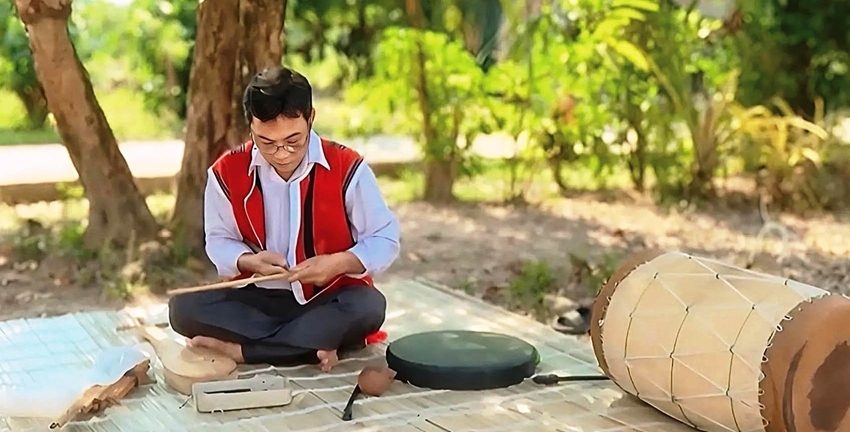 |
| Artisan Pi Ke Do has a passion for researching and crafting traditional musical instruments |
“Passion flows in my heart!”
Unlike children of the same age, Pi Ke Do has had a great passion for traditional folk music since he was young. “Back then, I only needed to hear my father and grandfather sing a song and play a musical instrument once, I could memorize the melody of that song. Once I memorized the melody, I learned how to play the musical instruments every day and performed them,” artisan Pi Ke Do recalled.
Every year, whenever the locality held traditional festivals such as Acha Aza Festival of the Ta Oi people, Arieu Piing Festival of the Pa Co people, Arieu Car Festival, and so on, Pi Ke Do get access to many new musical instruments of his people and other ethnic groups. Since then, he has had a greater love for traditional ethnic instruments. Regardless of which ethnic group these instruments belonged to, he wished to learn and play them superbly.
“I went to Nam Dong, Quang Tri, even Quang Nam just to seek the predecessors and elders to ask them to teach me how to play musical instruments. Partly to satisfy my passion for music, partly to learn so that I can teach the next generation,” artisan Pi Ke Do shared.
In the simple house of artisan Pi Ke Do, the walls are hung with many traditional musical instruments; he pointed to a rather strange musical instrument and introduced, “That is the ‘toong’, a musical instrument that I created myself. Crafting this instrument with a unique timbre was a long process of research and creation with love and passion for our traditional music. There were many failures, but in the end, the instrument was finalized.” Having said that, he took down the toong and played us a melodious piece of music with high and low sounds full of the flavor of the mountains and forests that we had never enjoyed before.
Additionally, Pi Ke Do always researches and learns to recreate precious musical instruments of the past, currently lost among the common people. He has successfully made more than a dozen musical instruments of the Pa Co, Ta Oi, Co Tu, Van Kieu, and Pa Hi ethnic groups such as drums, gongs, panpipes, flutes, etc. “I think all traditional musical instruments are made from natural forest trees, so why not make them myself? Buying them costs a lot of money!” Pi Ke Do confided.
Since then, Pi Ke Do has regularly participated in big festivals, bringing the folk melodies of his people to all the villages and hamlets at the foot of the majestic Truong Son mountain range. Artisan Pi Ke Do is known as a person who sings well, plays well, and is also a person who makes sophisticated and excellent musical instruments. “Not a big deal! Passion flows in my heart. I craft them because I like them,” Pi Ke Do smiled.
“I try my hardest in everything I do!”
Life is increasingly developing and modernizing alongside the introduction of music and modern musical instruments that attract young people, which also causes many traditional music forms of ethnic minorities to fall into oblivion. This is also what Mr. Pi Ke Do worries about when mentioning the fear of losing the traditional music of his ethnic minority. Therefore, he himself has searched for folk music and poems of his ethnic minority to hand them down to music lovers, especially the young generation in the village.
"The good artisans of musical instruments are now all old, I stay young and healthy, I will try my best to do whatever I can! Aside from preserving traditional musical instruments, I always desire to hand down the ability and experience I have to the younger generation so that the melodies, songs, and echoes of traditional musical instruments will forever resonate amid the Truong Son mountains…,“ artisan Pi Ke Do confided.
According to Ms. Le Thi Them, Head of the Division of Culture and Information of A Luoi District, Pi Ke Do has more than 30 years of experience in crafting unique musical instruments and is the person who preserves the traditional musical instruments and folk songs of the Pa Co people in particular and other ethnic groups in general. He is an active participant and a key figure in all big cultural activities and festivals of the locality.
